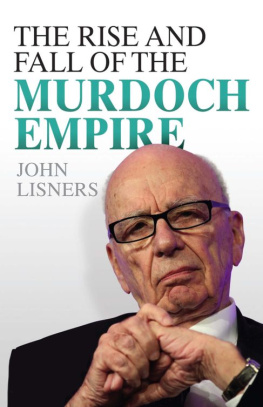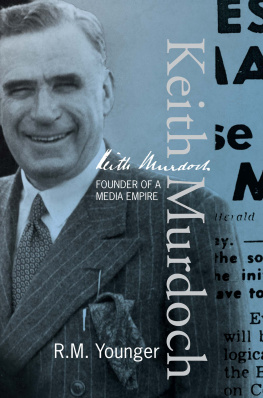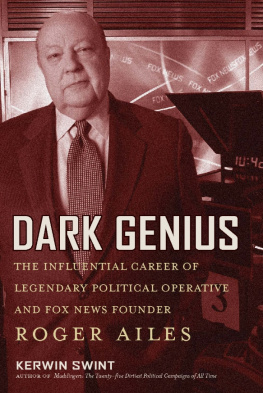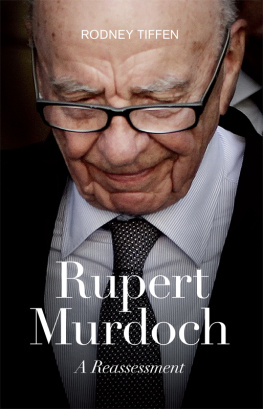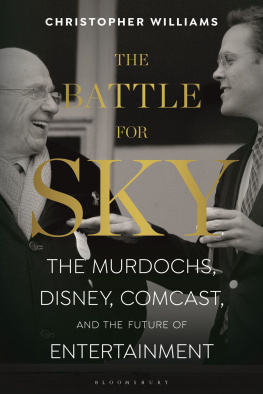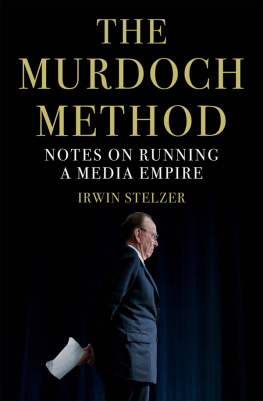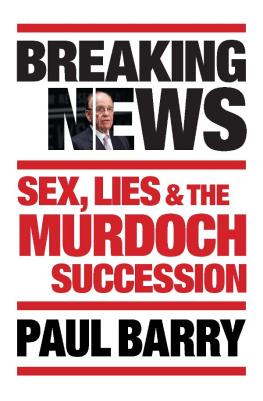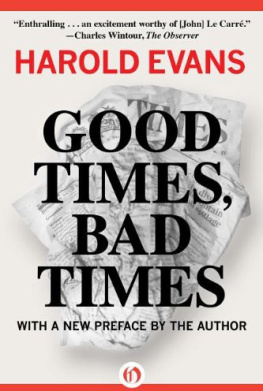Force void of judgment falls by its own weight Horace
I n January 2009 I had planned to write about the corporate culture of Rupert Murdochs News Corporation under the tongue-in-cheek working title: In Bed with Rupert Murdoch. Although I was never intimately involved with the worlds most powerful media mogul I closely observed his modus operandi and witnessed his growing influence through working inside the organisation on three different continents for lengthy spells over a period spanning 45 years, the major part of it in Fleet Street. I was on first name terms with many of his top executives, although I declined to join the team of Murdochs UK newspaper operation, News International, preferring to remain a freelance journalist. Nevertheless I was afforded a unique opportunity at NI where I had carte blanche to pursue investigations and feature stories of my own choice or to accept commissions on behalf of the company. I was able to take advantage of NIs seemingly limitless resources to engage in widely differing projects. There were no borders. I could travel wherever I pleased in pursuit of a good tale. And there were many of those.
In September 2010, it became apparent that activities at the News of the World over hacking and other serious forms of malfeasance were far wider than had originally been believed. The mighty vehicle created by Murdoch was in deep trouble, particularly as it had moved its headquarters from Australia to America where stringent laws applied to companies and overseas subsidiaries for which they were accountable under US legislation. The fallout from News Internationals UK holdings dramatically unfolded, each revelation building on the last. A mountain of killer revelations was finally exposed to the world which now threatened a global organisation, built, controlled and powered by its central figure Rupert Murdoch.
Was this the beginning of the end of the worlds most powerful newspaper mogul and his empire? Unlike other press barons whose fiefdom was restricted to national borders, Murdochs kingdom circled the globe and my working title now needed rethinking to embrace the cataclysmic changes. News International appeared to have succumbed to the myth of its seemingly impregnable position and had stepped on landmines of its own planting. One by one they were now exploding before a global audience.
I write this book from the view point of a working journalist and newspaper lawyer advising editors and journalists on the limitations dictated by law, convention, codes and ethics. As a journalist I had a clear window into the culture and workings of journalists and senior executives at Murdoch newspapers. A number of them have been arrested but not charged and I make no comment on the outcome of police inquiries into their behaviour. The purpose of this book is to share with the reader my view from the window and also my own experiences undertaking commissions from News International and other relevant newspapers. Any view I express about employees or former employees of News Group Newspapers is a personal view only and does not relate to anything else.
Within News Group, as in most other large organisations, there were in my opinion a number of loose cannons who were given authority beyond their capability or judgment. As a general rule from my own observation, NI journalists who abused that authority or judgment were unlikely to be punished where it led to a positive result. In fact, abuse of authority leading to publication of a good story could have quite the opposite effect and be rewarded by the journalists line manager or editor who might for whatever reason not wish to know the full background of how that journalist obtained the story or if the story was correct.
Village Fleet Street was a fascinating mix of personalities and talent. It promoted talent and enterprise and despised failure. It allowed unimaginable excesses among its denizens and overlooked their personal failings providing they produced results. It was a place where prejudices could be aired and criticised in the same newspaper and where reputations could be ruined overnight by vindictive writers with personal prejudices. Supreme power of newspapers lay with the proprietor and the daddy of them all was Rupert Murdoch: Australian-born, anti-establishment to a degree, educated in England, citizen of America by choice and media billionaire through being the smartest operator of them all and hardnosed beyond imagination.
I joined Murdochs Daily Mirror in Sydney in 1966. One of his key executives, Frank Shaw, employed me on the basis that I had studied law and under the false impression that I had been junior chess champion of South Australia (I did not disillusion him). When the Mirrors Chief of Staff discovered I had been a university student and knew nothing about reporting I was given the dubious title of interstate editor and provided with a desk in the telex room which fortunately gave me valuable access to editors in regional offices and correspondents overseas. I would also see messages exchanged between Rupert Murdoch and interested parties outside his organisation.
The papers news editor was known as Macca and opened my eyes to an exciting media world where travel and adventure came to men and women who were markedly different from the norm. People like Macca himself who had been hired, fired and re-hired by Murdoch on several occasions and eventually made editor of the Sunday Mirror. He considered it de rigueur to benefit from overcharging expenses and told the story of how he had made a killing when sent to New Guinea to find an Asmat village where Michael Rockefeller, missing heir to his familys billions, was last seen alive. By chance, Macca found what he was looking for on the first day of searching but kept the details to himself. Tragically, young Rockefeller had either been eaten by cannibal tribes or killed by a crocodile. After two weeks Macca decided it was an appropriate time to break the news. He got his scoop and two weeks of expenses. At one mornings conference during a dustmens strike Maccas news list contained the acronym SARE. Rupert Murdoch happened to drop by and queried what the letters stood for. Shit and rubbish everywhere, came the response. Macca was unashamedly fearless.
Before long I was writing a TV column for the Sydney Mirror and a weekly political column in The Australian, neither of which impressed Murdoch. I shared an office with the Mirrors showbiz writer Matt White who was to become my mentor and close friend. Matt had returned to Sydney from London and been offered the editorship which he declined, preferring instead to write about movies. Sean Connery would stay with him when visiting Sydney and, according to Matt, rarely bothered to get dressed because of the queue of eager women begging to meet him. Matt had been a fighter pilot in the Second World War and later became a journalist and film producer. When he was in London, he had rented a flat in Hampstead with his friend the Earl of Coventry, a lover of cricket, gambling and high living. As a result, Matt was one of the few journalists to share the services of a butler while working for Associated Newspapers.
In Sydney, competition between the two evening newspapers was fierce. The Sun, part of the Fairfax group, was gradually overtaken by Murdochs Mirror, which he purchased soon after inheriting the Adelaide News. In order to overtake the Sun, he took the Mirror downmarket, publishing sensational stories under huge headlines and offering rich prizes to attract readers. Journalists on the two opposing newspapers would think nothing of engaging in dirty tricks to beat their rival. It was real Front Page stuff. Not pretty, but effective.
Reporters would impersonate doctors or policemen in pursuit of an exclusive. There was an outcry after a photographer donned a doctors coat and snatched a photograph of Mick Jaggers former girlfriend Marianne Faithfull. She had taken a drug overdose and been rushed to the intensive care unit of St Vincents hospital in Sydney. Despite the unlawful means used, the Sunday Mirror splashed on the story with the headline: S COOP ! M ARIANNE IN A COMA . It showed the singer lying in bed with tubes stuck in her mouth and a caption which read, First exclusive picture of Marianne Faithfull, Mick Jaggers girlfriend, as she lies in hospital fighting for life after an overdose of drugs. Although the Australian Journalists Association condemned the tactics used, newspapers in Australia and in Britain were happy to publish the dramatic photograph. Sydney provided an excellent training ground for Fleet Street.

